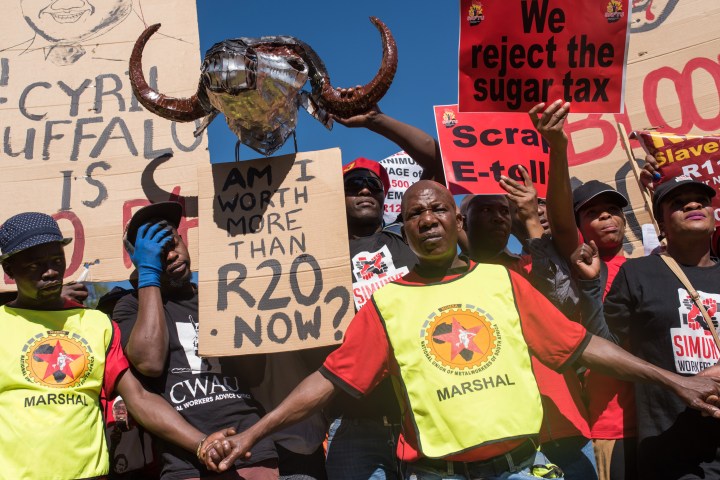New Frame
A glimpse into the lives of those who turned the streets red

On Wednesday the general strike called by the Saftu (South African Federation of Trade Unions) bought cities and towns across South Africa to a standstill. The images of the huge red river running through down town Johannesburg showed that a powerful new actor has arrived on the national stage.
In an important development, resonant of the politics of the 1980s, the strike was also supported by organisations and popular movements, including the rapidly growing shack dwellers’ movement Abahlali baseMjondolo, which are organised in communities rather than workplaces.
Many of the protesters who have been on the streets in Mahikeng to demand the removal of the Premier, Supra Mahumapelo, hoped that President Cyril Ramaphosa would act against the Zuma-aligned premier. Popular anger against corruption took a pro-Ramaphosa form. But Wednesday’s strike was the first significant popular challenge to Ramaphosa’s new Presidency, and the first significant challenge to it from the left.
New Frame spent time with individual people participating in the protest in down town Johannesburg to get a sense of the experience and thinking of ordinary participants in the event. One of the workers that we spoke to was Nobuhle Mabena. She is an unemployed mother of five, and a member of NUPSWA (National Union of Public service and Allied Workers).

Photo: Nobuhle Mabena, 46, spoke to the New Frame about why she was a part of today’s national shutdown. April 25, 2018 Photo: Daylin Paul for New Frame
Mabena was working for a ward-based outreach programme in Tembisa, where she did door-to-door work taking care of HIV positive patients and orphans. Her work included bathing bedridden patients and cleaning for them.
The 46-year-old lost her job in 2016 when the Department of Health outsourced the work to Smartpurse. Mabena claims she lost her job because she led a protest against outsourcing. “They called others and I was not called. I am two years and four months unemployed”.
She claims that they were times where she and her colleagues worked without basic care materials.
“Sometimes we did not have medical gloves, so we used plastic bread bags when washing HIV positive patients. But today they are throwing us out like Chappies,” Mabena said with a strong sharp voice as she made elaborate hand gestures.
Mabena firmly rejected the suggested minimum wage. “What are you going to buy with R3,500? That’s change. Food is expensive, even clothes. We don’t have funeral policies, how are we going to pay for that?” she asked as she shrugged her shoulders with a wry smile on her face.
“Today I am here to support the workers, because I did not even get a letter of dismissal explaining why I was fired,” she explained. Mabena added that people were there to support each other. “We shouldn’t allow them (employers), to play with us.”
Thokazani Mkwebane, is one of the workers who left his home in Soweto, Orlando to be part of the march. He dressed in black to represent his union, the Young Nursing Indaba (YNI).

Photo: Thokozani Mkwebane, 24, spoke to the New Frame about why he was a part of the national shutdown on April 25, 2018. Photo Daylin Paul for New Frame
In 2013, Mkwebane, started working as a gardener at Chiawelo clinic in Soweto, earning a salary of R2,200. He said that his motive for being part of the march was because in 2014 the clinic promised to employ him on a permanent basis, which would include a salary of R5,000, but that has not yet happened. “They want us to earn R3,500 so they addedR1,300 to make it R3 500,” he explained.
The 24-year-old is a breadwinner, and he rents a room in a three-bed roomed house in Orlando with his girlfriend and his daughter. He added that his salary is not enough to cover household spending. “The minimum wage does not give you the allowance to do things as a person, like providing food and buying clothes for my kid. It seems like you are working but you are not working, because it’s not enough,” he said as he slowly rubbed his hands together.
After taking his time to carefully articulate each word, the father of one said that he feels as though he is not doing enough for his family with his salary. “As a black guy I need to have my own house. To put bread on the table and give my child a good living. But in that R2,200 I can’t provide for my child. It’s like I am not a present parent in her life. So I need to provide anything that she needs.”
The people on the streets in Johannesburg yesterday are living very difficult and, in many ways, impossible lives. They roared their approval for the speakers on the stage when they insisted on a living wage.
In cities like Durban and Cape Town the idea of land for living is winning significant popular support in impoverished communities. It is clear that in the workplace the idea of a living wage rather than a survival wage also has real popular support. On the streets of Johannesburg yesterday it was evident that a political force that can speak to people’s desire for decent and dignified lives has real potential. DM
















 Become an Insider
Become an Insider